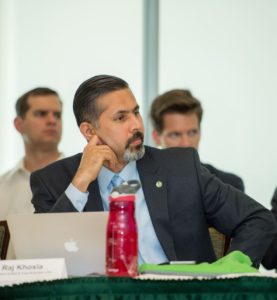National Academies names Raj Khosla to committee of Science Breakthroughs 2030
by Jennifer Dimas | June 13, 2017 9:26 AM

The National Academies of Sciences, Engineering, and Medicine has named 13 renowned thinkers to the executive committee of Science Breakthroughs 2030[1], an initiative that will identify the most compelling scientific opportunities in food and agriculture in the next decade and beyond. CSU Professor of Precision Agriculture Raj Khosla is among the elite 13 members.
Leading the precision agriculture platform
“There has never been a more exciting time to be in agriculture,” said Khosla, who works in CSU’s Department of Soil and Crop Sciences[2]. “Our laboratory at CSU has been leading the precision agriculture platform for the past two decades and it is heartwarming to hear and see that farmers, practitioners, scientists, and policymakers are taking note of what smart agriculture can deliver now and in future. I am honored to be part of this truly august group of thinkers and intellectuals and I am looking forward to learning and contributing to this national and global effort.” Khosla has previously served two terms on the US Presidential Advisory Board for NASA and was named Jefferson Science Fellow by the National Academies in 2012.
Uniquely qualified
“Dr. Khosla is uniquely qualified to serve The National Academies of Sciences, Engineering, and Medicine to develop a scientific strategy for near and long-term research to improve efficiencies in food production and agricultural systems,” said Mark Brick, department chair of Soil and Crop Sciences. “He is highly respected locally, nationally, and internationally for his research accomplishments in Precision Agriculture and his ability to understand emerging opportunities. Dr. Khosla was among the first ones to use the concept of management zones to improve nutrient use-efficiency, preserve natural resources, and maximize return on their investment. Today all Precision Agriculture programs use the concept of management zones. He embodies the spirit and application of global cooperation among the brightest and best interdisciplinary research teams.”
Science Breakthroughs 2030 will respond to the numerous reports issued by government and non-governmental organizations on the relationship of the food and agricultural system to public health, national security, the economy, and the environment. Such reports emphasize the need to dramatically and sustainably increase food production worldwide to feed a growing global population. Tapping the ingenuity and knowledge of the American research community, Science Breakthroughs 2030 will produce a blueprint for research directions to address key issues in food and agriculture.
Perfect set of leaders
“Farmers are facing more problems at a faster pace than ever before,” said Thomas Grumbly, president of the Supporters of Agricultural Research (SoAR) Foundation, which helped conceive and fund Science Breakthroughs 2030. “This is the perfect set of leaders to produce a research agenda to address the challenges of today and tomorrow.”
“Strategic investment in food and agriculture research is critical to our economic and national security and to our position as a global leader,” said Sally Rockey, executive director of the Foundation for Food and Agriculture Research (FFAR), another major study funder. “I am confident that the Committee members announced today will effectively engage the broader community to produce an agricultural research strategy that leverages the greatest scientific opportunities for public benefit.”
A public launch reception for Science Breakthroughs 2030 is scheduled for Wednesday, June 14 at the National Academies of Science headquarters in Washington, D.C., after the committee meets for the first time. There, research stakeholders will be able to learn more about the project and how they can participate.
The Foundation for Food and Agriculture Research
The Foundation for Food and Agriculture Research, a 501 (c) (3) nonprofit organization established by bipartisan congressional support in the 2014 Farm Bill, builds unique partnerships to support innovative and actionable science addressing today’s food and agriculture challenges. FFAR leverages public and private resources to increase the scientific and technological research, innovation, and partnerships critical to enhancing sustainable production of nutritious food for a growing global population. The FFAR Board of Directors is chaired by Mississippi State University President Mark Keenum, Ph.D., and includes ex officio representation from the U.S. Department of Agriculture and National Science Foundation.
Supporters of Agricultural Research (SoAR) Foundation
The SoAR Foundation leads a non-partisan coalition representing more than 6 million farming families, 100,000 scientists, hundreds of colleges and universities as well as consumers, veterinarians, and others. SoAR educates stakeholders about the importance of food and agricultural research to feed America and the world and advocates for full funding of USDA’s Agriculture Food and Research Initiative (AFRI). SoAR supports increased federal investments to encourage top scientists to create agricultural solutions that improve public health, strengthen national security, and enhance U.S. economic competitiveness.
- Science Breakthroughs 2030: http://nas-sites.org/dels/studies/agricultural-science-breakthroughs/
- Department of Soil and Crop Sciences: http://soilcrop.agsci.colostate.edu/
Source URL: https://source.colostate.edu/national-academies-names-raj-khosla-committee-science-breakthroughs-2030/
Copyright ©2024 SOURCE unless otherwise noted.